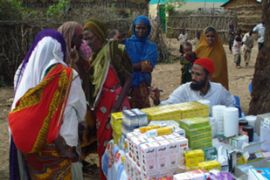Aid workers discuss Somali security
A UN aid agency pulls out of Somali town as insecurity and violence increases.

UNDP ‘flees’
The governor of Baidoa, where the Transitional Federal Government is seated, said on Sunday that staff from the United Nations Development Programme (UNDP), had withdrawn from the town.
Abdifatah Mohamed said: “We expected them to stay and complete their projects, but now they have fled.”
A week ago, armed men shot dead Osman Ali Ahmed, the local head of the UNDP.
UNDP officials could not immediately be contacted for comment.
In the latest violence, men shot dead the deputy head of a German charity south of the capital on Friday.
Mohamed Muhamoud Keyre, the deputy head of Daryeel Bulsho Guud (DBG), a German-funded charity, died instantly after he was shot near Mogadishu.
Earlier on Friday, Ali Bashi, who heads SORDA, a Mogadishu-based charity group, suffered gunshot wounds after he was attacked while distributing food to internally displaced people (IDP), a UN official said.
“They [armed men] seriously wounded him in Taredishe camp, 13km south of Mogadishu where he was distributing food to IDPs,” the official said.
SORDA works with the World Food Programme (WFP) in distributing relief.
Life-threatening job
Meanwhile, other gunmen shot and killed a WFP-contracted driver in the country’s southern region, the fourth to be slain this year while delivering food in the anarchic nation.
Ahmed Saali was shot when fighting broke out on Monday between convoy escorts and fighters at a checkpoint in the Lower Shabelle region, the agency said in a statement.
“WFP food is reaching many people, but our drivers are daily risking their lives to deliver it,” said Peter Goossens, WFP director for Somalia.
United Nations officials have appealed to the Somali government and Islamist groups, which are fighting for the control of the country, to spare aid workers, many of whom have been killed or kidnapped in recent months.
Suspicion for the killings and kidnapping usually falls on fighters linked to al-Shabab movement, the military wing of the Union of Islamic Courts (UIC). But residents say there has been an increase in revenge killings and criminal activity.
The problem has also been compounded by the growth of professional kidnapping rings. Security experts say the rings have been encouraged by the large cash ransoms paid by foreigners to release ships taken by pirates off the Somali coast.
Aid bias?
Sheikh Abdirahim Isse Adow, a spokeman for the UIC, condemned the killing of humanitarian workers.
However, he accused some aid agencies of siding with the government and singled out the UNDP, accusing the agency of providing local police with vehicles and salaries.
Aid workers have also been accused by officals from the TFG of “aiding” Islamist fighters.
The African Union mission to Somalia has deployed 2,600 peacekeepers to the country, well short of a promised 8,000 troops. So far it has failed to stem the violence.
On June 9, the rival Somali sides signed a truce agreement at UN-mediated talks in Djibouti.
The deal gave both sides one month to implement a cessation of hostilities but it was opposed by some members of the UIC who have continued their struggle, insisting that a withsdrawal of Ethiopian troops, also stationed in the country, was a precondition to talks.